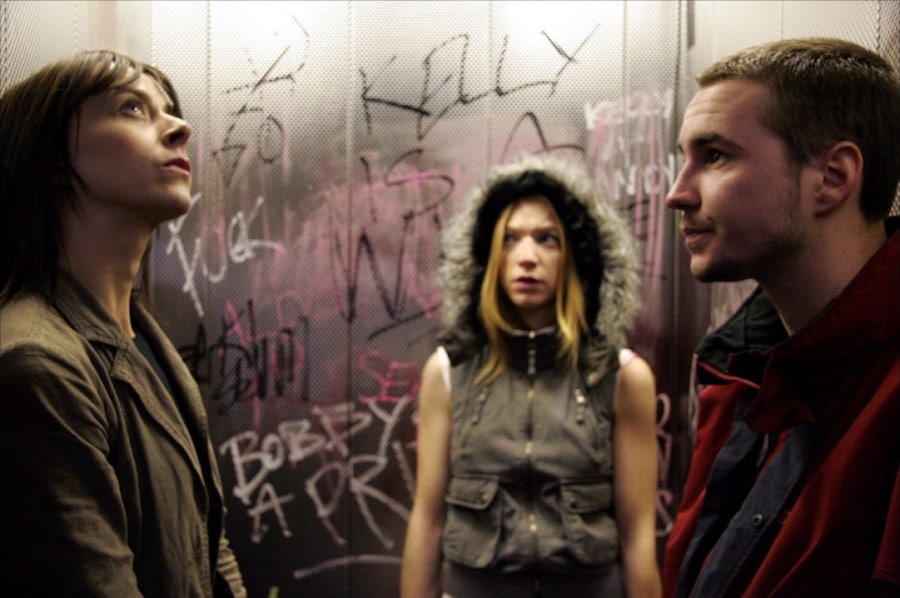Ever get the feeling that someone is watching you?
We meet the protagonist of Red Road sitting before a towering wall of screens. A CCTV operator, Jackie spends her days watching live feeds from cameras throughout Glasgow, on standby to report any unusual or criminal occurrences. One can already imagine her dozing off at her station, lulled to sleep by the mind-numbing routines of pedestrians going unremarkable places to do unremarkable things. Jackie, however, is mentally locked in to her post — using a joystick, she zooms in on people she finds interesting. A man tugging his dog along on a walk. A woman singing to herself behind a shop window. Whoever catches her eye. All of her subjects have one thing in common, though: they don’t know they’re being watched.
When Andrea Arnold’s Red Road (2006) screened under the Directors’ Fortnight category this year at Cannes, it was a bit of an odd-man-out. While the category typically seeks to highlight new releases from emerging directors, Red Road is almost two decades old, and Arnold is a well-established industry force at this point. Rather, with Arnold’s new film Bird premiering in competition at this year’s festival, a screening of her debut film (and the Q&A that followed) offered a retrospective look into Arnold’s origins and context for the premiere to come.



Red Road (2006)
As a director, Arnold is much like Jackie. She seems to comb through the everyday, observing life like film, searching for glimpses of things that sparkle (or rather, burn) and can unfurl into stories. Her films feel extraordinarily rooted in the real world, often stationing non-actors at their helms and opting for intimate, unstable camerawork. Her work, although uniquely concerned with the hell of womanhood, calls to mind other filmmakers like Harmony Korine and Sean Baker who’ve similarly ventured into working class and impoverished life, creating gritty fiction that often feels like documentary. Yet Arnold’s perspective — like Jackie’s — stops short of voyeurism, born instead from an empathetic curiosity.
The plot of Red Road takes off when Jackie spots a man from her past on one of the CCTV cameras, and begins calculatedly pursuing revenge on him through a series of increasingly desperate schemes. It isn’t until much later in the film, however, that Jackie’s motives are truly revealed. By then, the film has spent its time losing steam while keeping the audience in the dark, and its big reveal lands with the force of a toddler’s punch. Jackie is even more haunted than successive Arnold protagonists such as Fish Tank‘s adolescent troublemaker Mia and American Honey‘s headstrong Star, but she lacks their fire and texture.
In the Q&A that followed the screening, Arnold revealed much of what goes into building the living, breathing worlds of her films. She hates technical directions in scripts and almost always shoots handheld. She leaves room for actors to speak their lines as they really would (even when their accents are indiscernible, as they often are) and to move freely; she even joked about shutting the cameraman in the cupboard until it’s time to roll, so he has to react in the moment. On casting non-actors, she spoke of visiting schools and asking teachers for their “naughtiest kids.” Yet her reality is still a mixture of planning and spontaneity — some things she is uncompromising about, whether it be a specific favorite line or a shot of a fly on a window, seemingly unplanned but written months before.
Although Red Road doesn’t stand too tall in Arnold’s filmography, the details of its world are just as vivid. It’s a world of worn wallpaper and mismatched mugs, of cigarette butts and bad sex. Red Road is full of great ideas — ideas taken to new heights in later projects, including the just-premiered Bird. But there’s still a particular low-to-the-ground appeal to witnessing Red Road‘s surveillance-state noir, even if you might nod off on the job.

